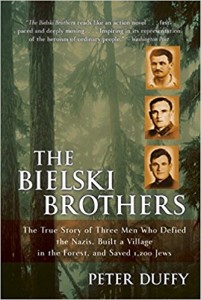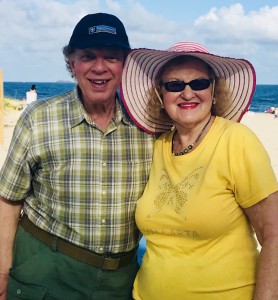Bruce and I attended the Yom HaShoah Commemoration of the Jewish Federation of Greater MetroWest and Kean University Holocaust Research Center on April 11th, featuring Robert Bielsky as Speaker.
Director of the Holocaust Council of Greater MetroWest, Barbara Wind, said Jews did not go to slaughter quietly during the Holocaust. Between 1941 and 1943, underground resistance movements developed in approximately 100 ghettos in Nazi-occupied Eastern Europe (about one-fourth of all ghettos), especially in Poland, Lithuania, Belorussia, and the Ukraine. Their main goals were to organize uprisings, break out of the ghettos, and join partisan units in the fight against the Nazis. There was widespread resistance by fighting and killing Nazis, Jews risking their lives to save other Jews, escaping from killing fields, ghettos and slave labor camps, keeping the Jewish religion alive and fighting with the Partisans in the forest. The Warsaw Ghetto Uprising lasted more than a month before the Germans overcame the Ghetto. That is longer than France or Belgium held up against the Germans before surrendering.
The surviving Jewish workers launched uprisings even in the extermination camps of Treblinka, Sobibor, and Auschwitz-Birkenau. About 1,000 Jewish prisoners participated in the revolt in Treblinka.
Barbara also pointed out Nazi cowardice when faced with allied troops at the end of WW2. SS guards and German troops laid down their arms and surrendered or just ran away.
Robert Bielsky said, “Let everyone know that Jewish resistance was widespread throughout the holocaust, in all the ghettos, camps, and in many partisan groups in the forest, wherever Jews had the option to stand up for themselves.”
 Robert told how his father, Tuvia Bielski, left the city for the forest after the Nazis killed his parents and two brothers in the Nowogrodek ghetto in December 1941. In the forest, Tuvia met his brothers, Zus and Asael, and vowed never to be caught by the Germans. After gathering about thirty of their family in the forest as a family camp, the family members chose Tuvia Bielski, a charismatic leader, who was a former Zionist activist, and a Polish Army veteran, as Commander. His brother, Asael, became his deputy, and Zus was placed in charge of reconnaissance.
Robert told how his father, Tuvia Bielski, left the city for the forest after the Nazis killed his parents and two brothers in the Nowogrodek ghetto in December 1941. In the forest, Tuvia met his brothers, Zus and Asael, and vowed never to be caught by the Germans. After gathering about thirty of their family in the forest as a family camp, the family members chose Tuvia Bielski, a charismatic leader, who was a former Zionist activist, and a Polish Army veteran, as Commander. His brother, Asael, became his deputy, and Zus was placed in charge of reconnaissance.
Tuvia set out on a mission to save as many Jews as possible, thus thwarting Hitler. The Bielskis encouraged people in nearby ghettos to escape and join them in the forest. Tuvia frequently sent guides into the ghettos to escort people to the forest. The Bielskis had been a Jewish farming family, the only Jews in the nearby village of Stankiewicze, so the brothers knew the region well, its geography, customs, and people. This familiarity and their friendships helped them to get guns and to elude the German authorities and their Belorussian auxiliaries. The Bielski Brigade fought in food raids, anti-Nazi missions and killed collaborators, but created a safe haven for Jews.
Tuvia Bielski never wavered in his determination to accept and protect all Jewish refugees. The Bielskis never turned anyone away, man, woman, or child, allowing the formation of a “Mobile Family Camp”, basically, an organized Jewish community in the forest. Everyone had a job. The skilled workers, at least 200 people, worked as cobblers, tailors, carpenters, leather workers, and blacksmiths.
The group established a mill, a bakery, and a laundry. There was a school, a synagogue, an infirmary, and a jail. Work groups supplied food for the camp and cleared land, when possible, to grow barley and wheat.
In August, 1943, the Germans launched a massive manhunt for them, and offered a reward of 100,000 Reich marks for information leading to Tuvia Bielski’s capture. The Germans were afraid to go into the forest. They didn’t know how many Jews were in the woods. The Germans were afraid of wild animals and snakes.
While saving Jews, and protecting the non-fighters in the camp, the Bielski group attacked the Belorussian auxiliary police officials, as well as local farmers suspected of killing Jews. The group disabled German trains, blew up rail beds, and destroyed bridges.
Over the next two and ½ years, the Bielski Partisans grew to 1,230 at Liberation. Over 70 percent were women, elderly persons, and children, who otherwise would have perished under the German occupation. An estimated 50 members of the Bielski group were killed, an unusually low casualty. Tens of thousands of descendants of the survivors they saved are alive today because of the Bielski Brigade.
Survivors told “How wonderful it was to be in the forest and be free.” Anna Monka, a Bielski Camp survivor was present and spoke eloquently about how the Tuvia Bielski saved her life. She told how as a young girl, she reached the Bielski Camp and found a family. She described the beauty of the forest.
Robert told how from his earliest remembrances, he would answer a knock on the front door every Sunday and 6 or 7 strangers would be there asking to see his father. They would pat his head and say “Your father saved my life!” Since Tuvia’s relatives had all perished, these survivors became Robert’s family, attending numerous Bar Mitzvahs and Weddings.
In 1955, Tuvia deposited 400 pages in Yiddish with Jonathan Brent at YIVO Institute for Jewish Research. In 2009, these pages were discovered, and had to be translated from Tuvia’s Yiddish to Yiddish and then from Yiddish to English. These pages resulted in the movie, “Defiance”, whose actors were all grandchildren of survivors or grandchildren of liberators.
We also spoke with Nathan Kasdan, an honored candle lighter and survivor, who told us he had escaped two killing fields by the age of ten, when he escaped to the forest. He fought at another camp of partisans in the forest. He said there were many camps of partisans, carrying out many raids all the time to kill Germans and bomb trains and bridges.
It was a beautiful ceremony and a memorable evening.
Natalie Baff
- A Glorious Evening - Thu, Jul 20, 2023
- My First Trip to Israel - Wed, May 3, 2023
- Guns - Thu, Jun 16, 2022


Thank you for sharing this. I wish o had been able to attend.